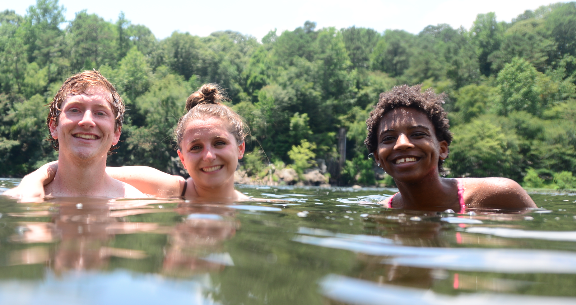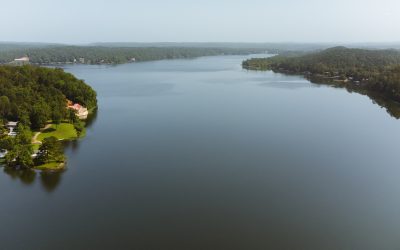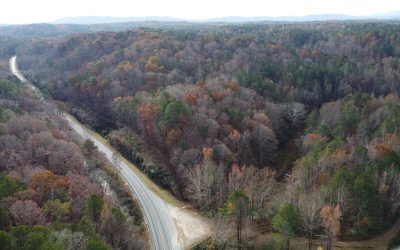Alabama’s legally defined summer recreation season starts today, May 1st.
Millions of Alabamians are ready for outdoor recreation, but their nearby sewage treatment facilities may not be. Alabama still lacks comprehensive regulations for minimum standards of public notification when sewage spills occur. Fortunately, new tools are available that help Alabamians to recreate safely. One of the most valuable is the Swim Guide program, where Coosa Riverkeeper tests 26 popular swimming holes for bacteria every week in the summer. In addition to these public outreach efforts, Coosa Riverkeeper uses advocacy to push our government towards more protections for Alabamians.
Here’s a timeline of this important work:
2015
Black Warrior Riverkeeper, Choccolocco Creek Watershed Alliance, Choctawhatchee Riverkeeper, Coosa Riverkeeper, and Logan Martin Lake Protection Association pushed the Alabama Department of Environmental Management (ADEM) to increase the legally defined summer recreation season by 50%, adding May and October. ADEM had previously included May and October in the winter season when sewage plants are allowed to discharge higher levels of bacteria than in the summer.
2016
In December 2016, the Environmental Management Commission (EMC), which oversees ADEM, adopted that suggestion to lengthen the legally defined summer recreation season. Additionally, the E. coli limit during the summer season was lowered 40% from 487 col/100mL (colony growing units of E. Coli bacteria per 100 milliliters of water) to 298 col/100mL. The improved regulations went into effect on February 3, 2017, but health threats remain for Alabamians due to inadequate public notifications when sewage spills occur.
2017
In March of 2017, Waterkeepers Alabama (Black Warrior Riverkeeper, Cahaba Riverkeeper, Choctawhatchee Riverkeeper, Coosa Riverkeeper, Hurricane Creekkeeper, Little River Waterkeeper, Mobile Baykeeper, and Tennessee Riverkeeper) worked with Alabama Rivers Alliance to file a petition for rulemaking with the EMC. The petition sought to improve the minimum requirements imposed on sewage treatment facilities for public notification of sewage spills.
Although the Commission denied the petition, they agreed to work with ADEM and the public to determine the need for additional notification rules. In May of 2017, ADEM launched an opt-in email sewage spill notification system which Waterkeepers Alabama and the Alabama Rivers Alliance requested. The water advocacy groups relayed their appreciation for this progress while continuing to promote their petition’s additional suggestions for protecting Alabamians from sewage overflows. That effort continues because ADEM’s sewage notification tools are limited to email and only as effective as the information supplied by local wastewater system operators.
Unfortunately, Alabamians continue to see lag time in reporting or even no reporting from some sewage system operators. Waterkeepers Alabama and the Alabama Rivers Alliance contend that ADEM’s tools do not relieve the local sewage treatment systems of their obligation to notify the nearby public in harm’s way. The groups believe that notification must contain a local component to reach those Alabama citizens who do not have access to email and the internet or who may not know about ADEM’s notification program.
Waterkeepers Alabama and the Alabama Rivers Alliance have again asked the EMC to amend their regulations to supply this critical local component. The groups want to ensure that every swimmer and fisherman has the best information available to make informed decisions enabling them to stay safe. The petitioners therefore continue to pressure the EMC to amend its regulations to provide minimum standards of public notification, including these items from their petition:

Interns Robert & Marilyn clownin’ around with Southern Exposure Film Fellow, Cai, on the Coosa below Jordan Dam. One of the 2016 Swim Guide sites!
- 12 hours to notify public of a spill that may endanger their safety
- Physically post signs in affected areas after sewage spills
- Social media and news media notification
- Opt-in list for email, text and/or telephone notification
- An enforceable response plan to incorporate these requirements
“Alabamians will not be able to make informed decisions about water recreation until Alabama has a sewage spill notification system that combines state and local components with a clear, detailed, and enforceable plan,” said Eva Dillard, staff attorney, Black Warrior Riverkeeper.
This post was written by Frank Chitwood, Staff Riverkeeper.






